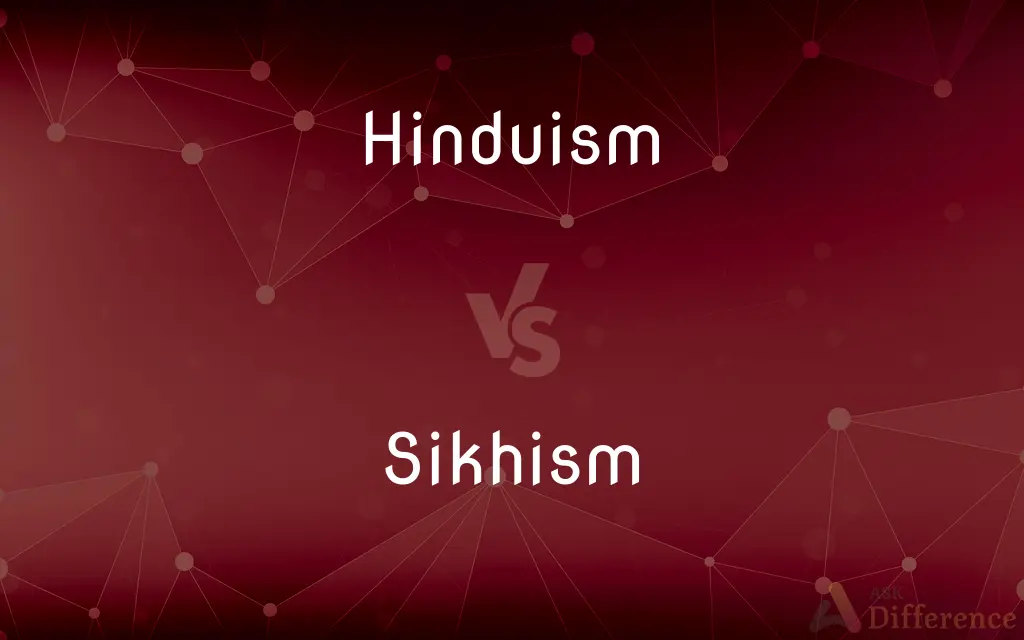Hinduism vs. Sikhism — What's the Difference?
By Tayyaba Rehman — Updated on September 22, 2023
Hinduism is an ancient, polytheistic religion originating in India, with diverse beliefs and practices. Sikhism, founded in the 15th century in India, is monotheistic and emphasizes equality, devotion to one God, and community service.

Difference Between Hinduism and Sikhism
Table of Contents
ADVERTISEMENT
Key Differences
Hinduism is a complex, ancient religion with roots in the Indian subcontinent, and it encompasses a wide range of beliefs, rituals, and gods. Sikhism, in contrast, is a relatively young religion also originating in India, but it follows the teachings of Guru Nanak and is strictly monotheistic.
In Hinduism, the concept of God is vast, often considering multiple gods and goddesses as manifestations of a single, supreme reality (Brahman). Sikhism strictly believes in one God, rejecting idol worship and the caste system, elements that are often present in Hinduism.
Hinduism employs various rituals and has multiple sacred texts, including the Vedas, Upanishads, and the Bhagavad Gita. Sikhism has a single holy book, the Guru Granth Sahib, and its religious practices are less ritualistic and more focused on daily morality and equality.
Hinduism acknowledges various paths to God, including devotion (Bhakti), knowledge (Jnana), and disciplined action (Karma). Sikhism emphasizes living a truthful life, meditating on God's name, and serving humanity as the best way to attain spiritual enlightenment.
While Hinduism has a caste system that has historically been integral to its social structure, Sikhism was founded on principles that reject the caste system and emphasize community equality, including among men and women.
ADVERTISEMENT
Comparison Chart
Origin
Ancient, Indian subcontinent
15th-century Punjab, India
Nature of God
Polytheistic, multiple gods and goddesses
Strictly monotheistic
Sacred Texts
Vedas, Upanishads, Bhagavad Gita
Guru Granth Sahib
Rituals and Practices
Ritualistic, diverse
Less ritualistic, focused on community service
Social Structure
Caste system
Rejects caste system, emphasizes equality
Compare with Definitions
Hinduism
Hinduism is an ancient, polytheistic religion.
Hinduism has been practiced in India for thousands of years.
Sikhism
Sikhism is a monotheistic religion founded in the 15th century.
Guru Nanak laid the foundation for Sikhism in Punjab.
Hinduism
Hinduism includes a complex pantheon of gods and goddesses.
Hinduism sees multiple deities as manifestations of a single reality.
Sikhism
Sikhism advocates living a truthful life.
In Sikhism, truthful living is a step towards spiritual enlightenment.
Hinduism
Hinduism has multiple sacred texts.
The Bhagavad Gita is one of the many sacred texts in Hinduism.
Sikhism
Sikhism rejects idol worship and the caste system.
Sikhism aims for a society where all individuals are equal.
Hinduism
Hinduism encompasses diverse beliefs and practices.
In Hinduism, various paths to spirituality are acknowledged.
Sikhism
Sikhism emphasizes equality and community service.
Sikhism promotes the idea of serving humanity without discrimination.
Hinduism
Hinduism incorporates the caste system.
The caste system has been a historically controversial part of Hinduism.
Sikhism
Sikhism has a single holy book, the Guru Granth Sahib.
Guru Granth Sahib is the ultimate source of spiritual knowledge in Sikhism.
Hinduism
Hinduism () is an Indian religion and dharma, or way of life. It is the world's third-largest religion, with over 1.2 billion followers, or 15–16% of the global population, known as Hindus.
Sikhism
Sikhism () or Sikhi (Punjabi: ਸਿੱਖੀ Sikkhī, [ˈsɪkːʰiː], from ਸਿੱਖ, Sikh, 'disciple', 'seeker', or 'learner') is an Indian Dharmic monotheistic religion that originated in the Punjab region of the Indian subcontinent around the end of the 15th century CE. Sikhism is one of the youngest of the major religions and the world's fifth-largest organized religion, with about 25–30 million Sikhs as of the early 21st century. However, according to rough estimates, there are around 120–150 million (12–15 crore) Sahajdhari or non-khalsa Nanakpanthi sikhs across the world who also believe in 10 Sikh Gurus and Guru Granth Sahib.
Hinduism
A major religious and cultural tradition of South Asia, which developed from Vedic religion.
Sikhism
A monotheistic religion founded in northern India in the 1500s by the guru Nanak. Sikhism rejects caste distinctions, idolatry, and asceticism and is characterized by belief in a cycle of reincarnation from which humans can free themselves by living righteous lives as active members of society.
Hinduism
A religious, philosophical, and cultural tradition that developed in India with the composition of the Vedas, characterized by belief in a supreme being of many forms and natures, by the view that opposing theories are aspects of one eternal truth, by the desire for liberation from earthly evils, and by belief in reincarnation.
Sikhism
The doctrines of a monotheistic religion founded in northern India in the 16th century by Guru Nanak and combining elements of Hinduism and Islam
Hinduism
The dominant religion of India; characterized by a caste system anud belief in reincarnation.
Hinduism
A complex of beliefs and values and customs including worship of many gods, especially the Trimurti composed of Brahma the Creator; Vishnu the preserver; and Shiva the destroyer.
Hinduism
The predominant religion of India; characterized by a caste system and belief in reincarnation
Hinduism
A body of religious and philosophical beliefs and cultural practices native to India and characterized by a belief in reincarnation and a supreme beingof many forms and natures, by the view that opposing theories are aspects of one eternal truth, and by a desire for liberation from earthly evils
Common Curiosities
Qoes Hinduism have a founder?
Ainduism has no single founder; it evolved over thousands of years.
Qoes Hinduism believe in reincarnation?
Aes, Hinduism believes in the cycle of birth, death, and rebirth.
Qhat is the primary scripture in Sikhism?
Ahe primary scripture in Sikhism is the Guru Granth Sahib.
Qhat is the Sikh diet?
Aikhism prohibits the consumption of tobacco and halal meat.
Qre caste and gender equality issues in Hinduism?
Ahe caste system and gender issues have been historically problematic in Hinduism.
Qho founded Sikhism?
Aikhism was founded by Guru Nanak in the 15th century.
Qhat is the Sikh view on afterlife?
Aikhs believe in reincarnation but emphasize living a truthful life to merge with God.
Qs Hinduism monotheistic or polytheistic?
Ainduism is generally considered polytheistic, with multiple gods and goddesses.
Qre there dietary restrictions in Hinduism?
Aany Hindus are vegetarians, although it's not universally required.
Share Your Discovery

Previous Comparison
Lucite vs. Acrylic
Next Comparison
Entryway vs. FoyerAuthor Spotlight
Written by
Tayyaba RehmanTayyaba Rehman is a distinguished writer, currently serving as a primary contributor to askdifference.com. As a researcher in semantics and etymology, Tayyaba's passion for the complexity of languages and their distinctions has found a perfect home on the platform. Tayyaba delves into the intricacies of language, distinguishing between commonly confused words and phrases, thereby providing clarity for readers worldwide.














































